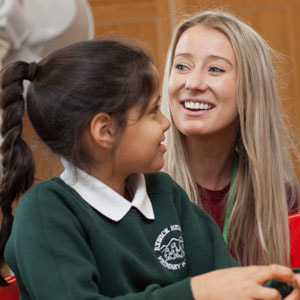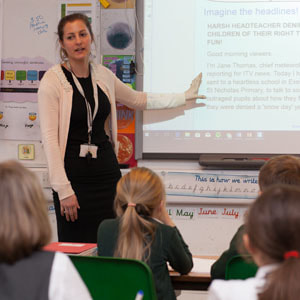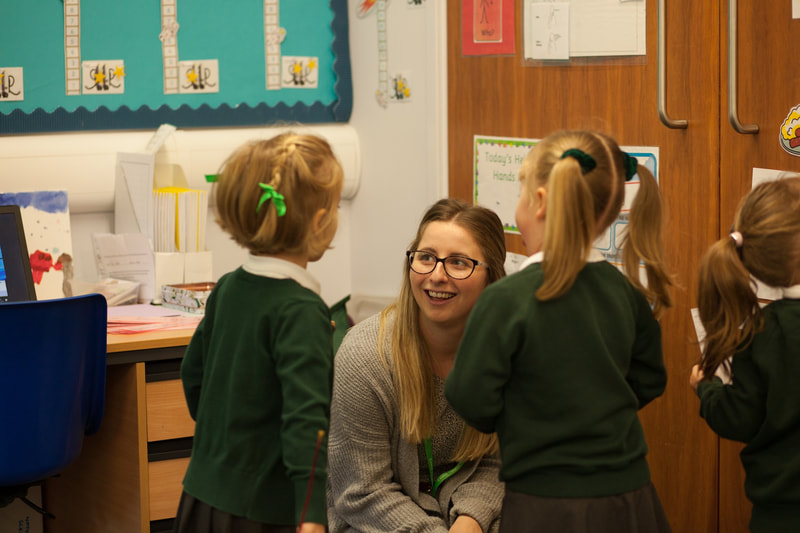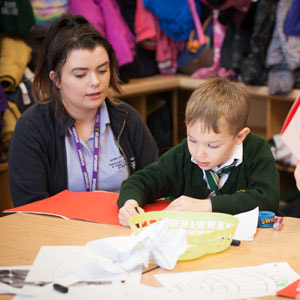Frequently Asked Questions
How long Does the Course take?
The course commences with a three day induction at the very end of August to ensure our trainees feel ready to go into their Home School at the start of the Autumn term. The course follows the school academic year, and trainees gain their Qualified Teacher Status (QTS) and PGCE by the end of June. This is a full time, one year course.
How much does The Course cost?
The cost of the course is £9,250.
Is there any funding available?
Trainees are only eligible for a bursary or scholarship if they’re entitled to support under the student finance criteria. Trainees from the EU, Iceland, Liechtenstein, Norway and Switzerland should read Studying in the UK: guidance for EU students.
Applicants with a degree from outside the UK can contact Get into Teaching or their chosen training provider for more advice.
For 2023 to 2024, there are bursaries of:
There are scholarships of:
Applicants with a degree from outside the UK can contact Get into Teaching or their chosen training provider for more advice.
For 2023 to 2024, there are bursaries of:
- £27,000 in chemistry, computing, mathematics and physics
- £25,000 in geography and languages (including ancient languages)
- £20,000 in biology and design and technology
- £15,000 in English
There are scholarships of:
- £29,000 in chemistry, computing, mathematics and physics
- £27,000 in French, German and Spanish (no other languages)
What qualifications do I need?
Entry requirements for our Primary 3 - 7 and Primary 5 - 11 courses:
Qualifications
Personal qualities
We are looking for candidates who have what we think it takes to become good or outstanding teachers. There are particular qualities that such teachers possess:
Other requirements
Qualifications
- Graduate Status (honours degree) or equivalent
- Passes at GCSE in English, Maths and Science at level 4 or above.
Personal qualities
We are looking for candidates who have what we think it takes to become good or outstanding teachers. There are particular qualities that such teachers possess:
- a passion for teaching
- an ability to form positive working relationships with children and adults
- an engaging and approachable nature
- a commitment to inclusive practice and social justice for all
- strong organisational skills
- good interpersonal skills
- creativity and innovation
- an exciting approach to learning
- the ability to reflect on practice
- a positive and professional outlook
Other requirements
- Although not obligatory, it will be useful for you to have had recent experience in a maintained school, in the appropriate phase. We can help you to arrange this if necessary
- A satisfactory DBS enhanced check
- Right to work in the UK
- An Occupational Health Check
Where can I find out more information about the courses?
How do I apply?
What Qualifications will I gain through your course?
Exeter Consortium works in partnership with South West Teacher Training who are the Accredited Provider which awards Qualified Teacher Status (QTS). Through three written assignments which are closely linked to your school-based practice, you will gain a Postgraduate Certificate in Education (PGCE) from the University of Exeter, Outstanding for ITT, which is worth 60 Master's credits and could allow you to go on and gain a full masters if you chose.
How much experience do I need in schools?
You will strengthen your application if you have recent, relevant school experience. However, if you do not have any current experience this will not prevent you from applying and being accepted onto the course. If you would like some voluntary school experience, please do not let this be a barrier to your application because we can help to organise this for you! Come and have a chat if you have any questions about this.
If you are gaining experience in school, we'd like to help you gain the most from it. Again, come and have a chat so we can guide you and support you so you learn as much as you can before you start training to teach.
If you are gaining experience in school, we'd like to help you gain the most from it. Again, come and have a chat so we can guide you and support you so you learn as much as you can before you start training to teach.
Where will the interviews be held?
We continue to hold our interviews online as it allows us to accommodate people's busy lives, but if you would like to meet us in person before your interview, we would be delighted to welcome you to our offices and training rooms prior to your interview. Once shortlisted, you will be invited to an online interview that will involve:
*a short presentation of a planned lesson
*a written task
*a panel interview
*opportunities to talk with a current trainee via telephone.
Successful candidates are greeted with a Welcome Pack which helps them through the preparations required to start the course. We pride ourselves on communicating regularly with successful candidates so that they feel like part of the Exeter Consortium community.
Applicants are encouraged to make contact with the office by phone or email and are welcome to chat informally with a member of our team before submitting an application. We are committed to making interviews as stress-free as possible - recognising how challenging they can be! We find that candidates do really enjoy our interviews, finding out more about us and our programmes. All candidates are offered feedback as soon as possible following the interview.
*a short presentation of a planned lesson
*a written task
*a panel interview
*opportunities to talk with a current trainee via telephone.
Successful candidates are greeted with a Welcome Pack which helps them through the preparations required to start the course. We pride ourselves on communicating regularly with successful candidates so that they feel like part of the Exeter Consortium community.
Applicants are encouraged to make contact with the office by phone or email and are welcome to chat informally with a member of our team before submitting an application. We are committed to making interviews as stress-free as possible - recognising how challenging they can be! We find that candidates do really enjoy our interviews, finding out more about us and our programmes. All candidates are offered feedback as soon as possible following the interview.
Who will conduct the interviews?
There will typically be two colleagues on our interview panel, including our Primary Programme Lead. We can also offer you the opportunity to chat to a current trainee.
What else can I do to strengthen my application?
- Arrange appropriate references (from two different sources)
- Research the programme
- Evidence recent school experience if applicable (paid or voluntary)
- Contact the office for initial discussion and possible visit
- Check all spelling and grammar on application (proof read)
- Come to your interview well informed and prepared
How soon after I have submitted my application will I know if I have secured an interview?
Once your application has appeared on our 'Apply' platform we will contact you shortly after receipt. If your application meets our criteria you will also be contacted by phone to arrange an interview date, but please do feel free to contact us any time after submitting your application if you need to.
If I am successful in securing a placement after interview, what do I need to organise before starting the programme in September?
- Fulfil the necessary paperwork requirements
- Complete the Disclosure and Barring Service Check
- Complete the Occupational Health report
- Make yourself available to attend the virtual Induction Day event in July
- Organise a visit to your Home School after the Induction Day
How will my school placements work?
Our Primary Trainees spend much more time learning the craft in school than on most other training programmes. You will be in your Home School for the autumn and summer terms, and in a contrasting second placement for the spring term. In September you will spend the whole of the first week in school, which allows you to get to know your school colleagues and see how positive learning environments are established by an experienced teacher in those important first days. There is release time from school to follow the Master's programme and General Professional Study training. You will be in school from Monday to Wednesday observing, teaching and working alongside your class teacher mentor, and you will have training on Thursdays and Fridays where you will come to our lead school, Countess Wear Community School or our Secondary school, West Exe School. We also have training Hubs in North Devon and Plymouth for trainees based in those areas. We keep our study days short to give you space in your week for you. Sometimes you will have study days at home.
During your block practice in the second half of the autumn and spring terms and also for most of the summer term, you will be in school full time, building confidence and working with a range of experienced teachers in school. You will have a Lead Mentor who visits you in school to support and quality assure your placement and progress. We also have members of the team who offer additional support when needed.
During your block practice in the second half of the autumn and spring terms and also for most of the summer term, you will be in school full time, building confidence and working with a range of experienced teachers in school. You will have a Lead Mentor who visits you in school to support and quality assure your placement and progress. We also have members of the team who offer additional support when needed.
WHAT DO OFSTED SAY ABOUT THE PROGRAMME?
We are proud that we were the very first Teacher Training Provider to be inspected under the rigorous new framework which has seen many Outstanding Providers lose this status. Our programmes were recognised as Good by Ofsted in 2021. Read the full report here. Since this report, we have continued to develop our programmes and are proud to offer programmes which are ahead of the curve and committed to excellence. Strengths of our training programme praised by Ofsted are:
- Newly qualified teachers are well prepared for their first teaching post
- Highly regarded by headteachers
- The partnership is overseen effectively by well-qualified leaders
- The welcoming nature of the partnership
- The responsiveness of partnership staff when trainees seek advice
- Personalised support that trainees receive means that trainees’ needs are met exceptionally well
- The partnership’s focus on ‘pedagogy not paperwork’ has been pivotal in supporting trainees to manage their workload
- Strong communication across the partnership and regular feedback mean that trainees develop into reflective practitioners
where does the training take place?
Our centre-based training takes place in our Teacher Training classrooms at Countess Wear Community School in Exeter for most trainees. We also have hubs in North Devon (East The Water Primary School) and Plymouth (St Matthew's CofE Primary and Nursery Academy). These days are held on a Thursday and Friday and are kept short to give you space in your week. There are three PGCE launch days in Exeter. Trainees are in school learning from their mentors Monday - Wednesday and for full weeks when they are in block practice phases. School placement days tend to be from 8am - 5pm but this can vary depending on a trainee's own commitments and the school setting.










